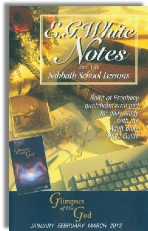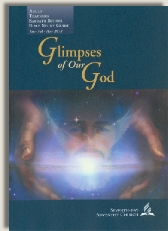|
||||||||||||||
Commentary on "The Triune God"
Day 5: Wednesday, January 4, 2012 - In Unity and Equality
Overview
The lesson for today talks about the “plurality” of the Adventist “Godhead.”
Observations
Today's lesson opens with the following statement: “However clear it is in the Bible that God is one (echad), the Bible also talks about the plurality of Persons.” And yet, as the prior days' lessons made clear, their claim is that the “oneness”/echad itself does describe a “plurality of Persons.”
The author then admits that their Godhead is a “group”: “This pairing of the plural and the singular when referring to God also occurs in Genesis 11:7, 8 at the building of the tower of Babel. God Himself speaks again. The 'Lord' is mentioned, yet He speaks as one of a group ('Us').”
But verses such as Genesis 11:7 cannot be used to teach a “plural” Godhead of multiple beings. Christian apologist Robert M. Bowman, Jr., writes the following in his study entitled “The Biblical Basis of the Doctrine of the Trinity”:
“II. This One God Is the Single Divine Being Known in the OT as Jehovah or Yahweh ('The LORD')
[…]
“B. This one God, the LORD, is one single divine being
“1. The Bible always refers to the LORD or God in the third person singular (he, his, him), never as they, and speakers in the Bible addressing God/the LORD always do so in the second person singular (you singular). Citing texts is really unnecessary because there are far too many occurrences, but see, for example, Gen. 1:5, 10; Ex. 3:6, 12-14; 20:7; Deut. 32:39; 1 Kings 18:39; Ps. 23:2-3.
“2. Whenever in the Bible the LORD or God speaks to human beings or other creatures, he always speaks of himself in the first person singular (I, and my/mine, not us/we and our/ours). Of the obviously numerous examples, see the especially famous examples in Ex. 3:14; Ex. 20:2; Deut. 5:6. He says 'I am the LORD' or 'I am the LORD your/their God' some 164 times in the OT (especially in Exodus, Leviticus, Numbers, Isaiah, and Ezekiel).
“3. This conclusion cannot be circumvented by saying that there is one 'Godhead' consisting of a plurality of divine beings. The word 'Godhead' is equivalent to the word 'Godhood' (-head is an old English suffix meaning the state or status of something, as in maidenhead, the state of being a maiden or virgin). In the English Bible it is used to translate three closely related words: theion ('divine being,' Acts 17:29), theiotês ('divine nature,' Rom. 1:20), and theotês ('deity,' Col. 2:9). In none of these texts does 'Godhead' refer to more than one divine being. The use of 'Godhead' as a term for the Trinity is not found in the Bible; it is not inaccurate per se, but it must be understood as a term for a single divine being, not a group of gods.
[...]
“1. As already noted, the Bible always refers to God in the singular, and he always speaks of himself with singular pronouns (I, me, mine, my) when addressing creatures. These singular forms do not disprove that God exists as three 'persons' as long as these persons are not separate beings.” (http://www.irr.org/trinity-part-II.html)
In the third paragraph of today's lesson, the author states: “In the New Testament, how does Peter’s sermon at Pentecost exalt Jesus within the Godhead? (See Acts 2:33.)” The Easy Reading Edition puts it this way: “In the New Testament, how does Peter’s sermon at Pentecost honor Jesus as part of the Three-in-One God? (Read Acts 2:33.)”
In Acts 2:33 (NASB), the Apostle Peter says: “Therefore having been exalted to the right hand of God, and having received from the Father the promise of the Holy Spirit, He has poured forth this which you both see and hear.”
The Apostle Peter is talking about Jesus' ascension to heaven and the place of power that Jesus has as a man after His resurrection and ascension. He is not describing any exaltation of Jesus “within the Godhead.” And again notice that the Easy Reading version says that Jesus is merely “part” of “God.” Again, Jesus is, and always has been, fully (all of) God Himself—the one true divine Being.
Summary
- Verses such as Genesis 11:7 do not contradict monotheism and cannot be used to teach a “group” of multiple divine beings.
- Jesus Christ is God Himself—He does not merely have an exalted position “within the Godhead.”
- Jesus is not merely “part” of God. He is, and always has been, the one true God.
Copyright 2011 BibleStudiesForAdventists.com. All rights reserved. Revised December 29, 2011. This website is published by Life Assurance Ministries, Glendale, Arizona, USA, the publisher of Proclamation! Magazine. Contact email: BibleStudiesForAdventists@gmail.com.
The Sabbath School Bible Study Guide and the corresponding E.G. White Notes are published by Pacific Press Publishing Association, which is owned and operated by the Seventh-day Adventist church. The current quarter's editions are pictured above.
Official Adventist Resources
Standard Edition Study Guide Week 1
Teacher's Edition Study Guide Week 1
Easy Reading Edition Study Guide Wk 1
Search the Complete Published Ellen G. White Writings
Please Support This Project


